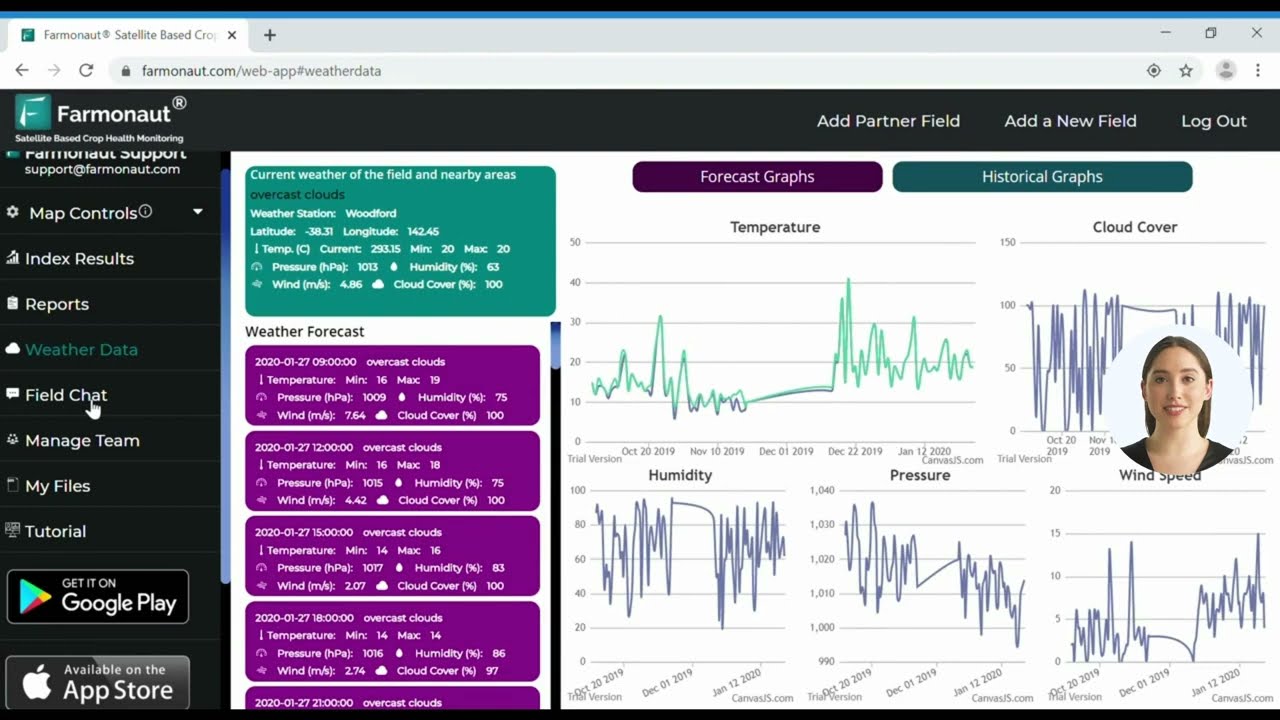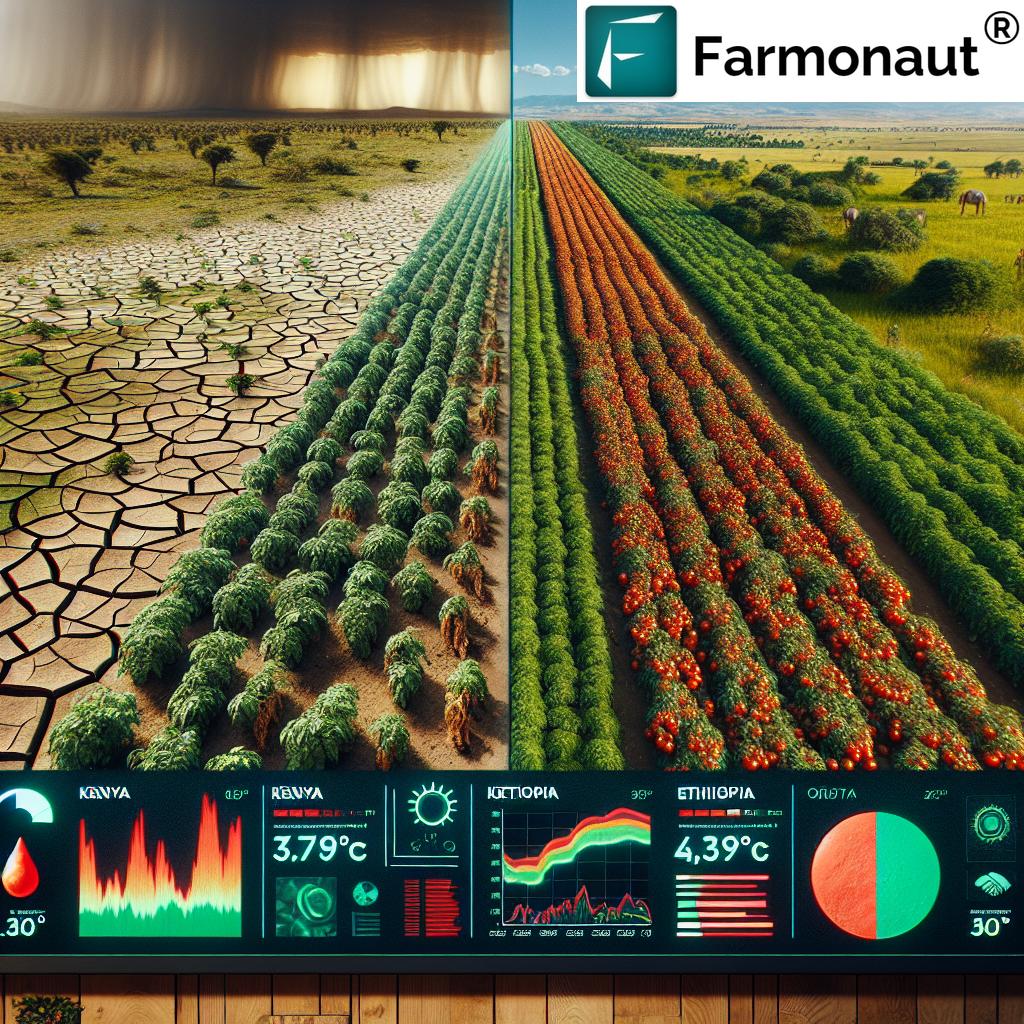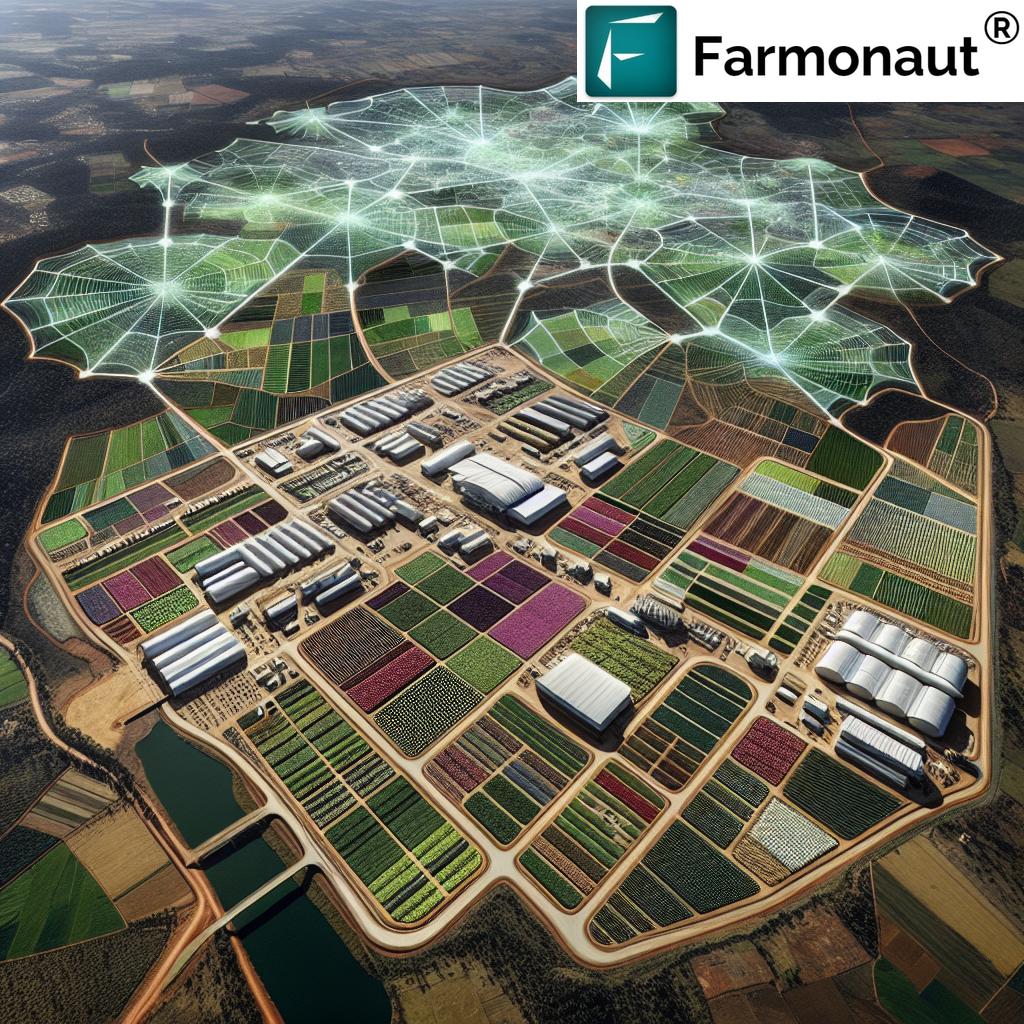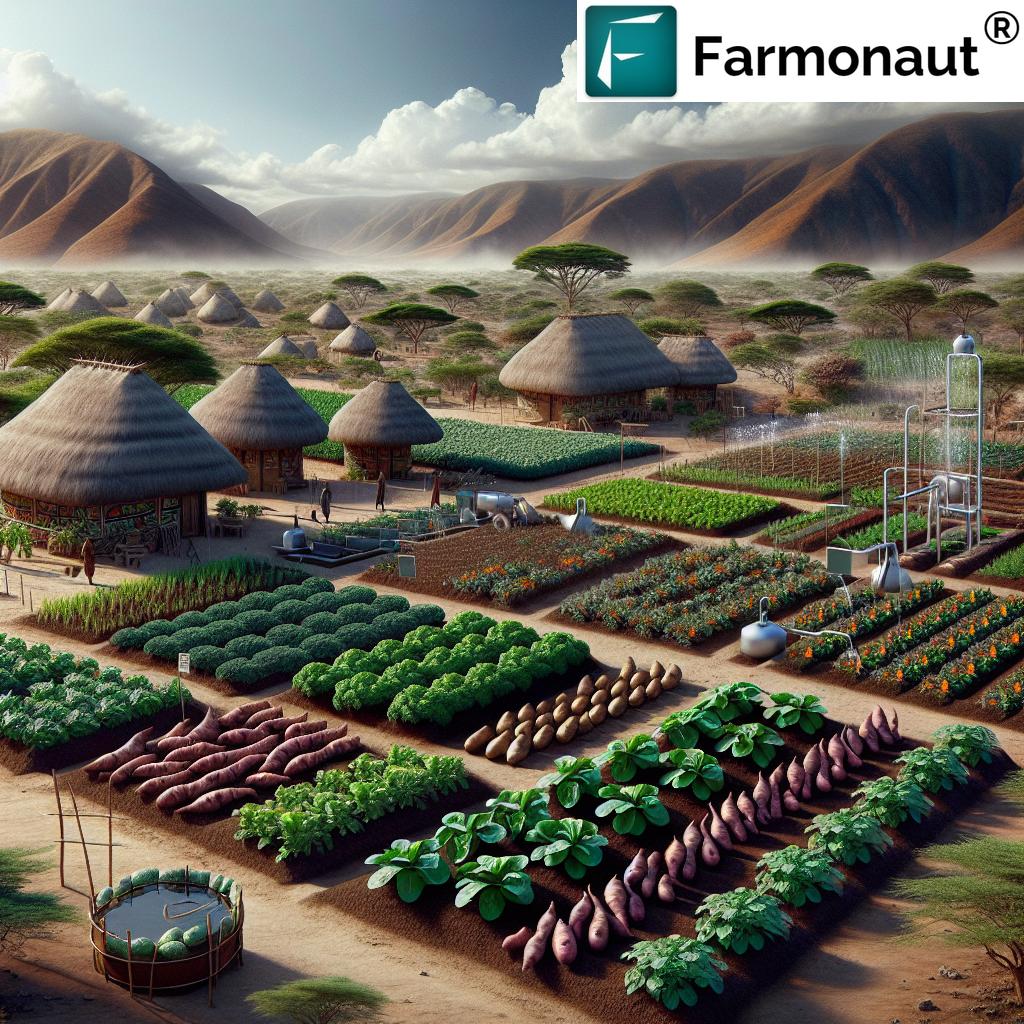Empowering Nigerian Smallholder Farmers: Innovative Digital Solutions for Sustainable Agriculture and Food Security
“Nigeria’s digital agricultural initiative targets 3 key crops: maize, cassava, and cocoa, aiming to boost productivity for millions of smallholders.”
In the heart of West Africa, a transformative revolution is taking place in the agricultural sector. We’re witnessing the dawn of a new era where digital agricultural extension services are set to redefine the landscape of smallholder farming in Nigeria. This groundbreaking initiative aims to address the pressing challenges of food security and agricultural productivity that have long plagued the nation.
As we delve into this exciting development, it’s crucial to understand the context and the potential impact of these innovative solutions on Nigeria’s agricultural future. Let’s explore how these digital tools are poised to empower farmers, enhance sustainability, and bolster food security across the nation.
The Current State of Nigerian Agriculture
Nigeria, the most populous country in Africa, relies heavily on its agricultural sector. Smallholder farmers, who form the backbone of this sector, contribute up to 90% of the country’s food production. However, these hardworking individuals face numerous challenges that hinder their productivity and threaten the nation’s food security:
- Limited access to quality agricultural advisory services
- Ineffective private sector solutions
- Underfunded public extension systems
- Lack of access to modern farming practices and technologies
- Difficulties in accessing markets and financial services
These barriers have long stood in the way of Nigeria’s ambitions towards agricultural self-sufficiency and food security. But now, a ray of hope shines through the clouds of uncertainty.
The Digital Agricultural Extension Services (DAES) Solution
On December 17, 2024, a pivotal moment occurred in Lagos, Nigeria. The Bill & Melinda Gates Foundation (BMGF), in collaboration with the African Forum for Agricultural Advisory Services (AFAAS), convened a crucial stakeholder meeting. The purpose? To validate plans for a transformative Public-Private Partnership (PPP) Digital Agricultural Extension Services (DAES) solution.
This innovative initiative is designed to bridge the gaps in the current agricultural system by fostering a sustainable ecosystem that delivers:
- Agronomic information tailored to local conditions
- Market insights to improve farmers’ bargaining power
- Financial information to enhance access to credit and insurance
The DAES solution prioritizes user-centered design and private sector leadership, aligning perfectly with Nigeria’s national agricultural goals of achieving food security while reducing dependency on imports.

Innovative Technologies Driving Change
At the core of this transformative initiative lies a blend of cutting-edge technologies designed to ensure accessibility for all farmers, including underserved populations and women. These technologies include:
- Unstructured Supplementary Service Data (USSD): This technology allows farmers without smartphones to access vital information through basic mobile phones.
- Interactive Voice Response (IVR): Farmers can receive audio-based information in their local languages, overcoming literacy barriers.
- Smartphone Applications: For those with access to smartphones, feature-rich apps provide comprehensive agricultural information and services.
By integrating these technologies, the DAES platform ensures that no farmer is left behind in this digital revolution.
The Role of Satellite Technology in Agriculture
One of the most exciting aspects of this digital transformation is the integration of satellite technology in agriculture. Companies like Farmonaut are at the forefront of this innovation, offering advanced, satellite-based farm management solutions.
Farmonaut’s platform provides valuable services such as:
- Real-time crop health monitoring
- AI-based advisory systems
- Blockchain-based traceability
- Resource management tools
These tools empower farmers with data-driven insights, enabling them to make informed decisions about irrigation, fertilizer usage, and pest management. The result? Optimized crop yields and reduced resource wastage.
Explore Farmonaut’s innovative solutions:
Addressing Key Challenges in Nigerian Agriculture
The DAES solution is designed to tackle several critical challenges faced by Nigerian smallholder farmers:
- Limited Access to Advisory Services: By leveraging digital platforms, farmers can now receive personalized advice on crop management, pest control, and soil health.
- Market Access: The platform provides real-time market information, helping farmers make informed decisions about when and where to sell their produce.
- Financial Inclusion: By partnering with financial institutions, the initiative aims to improve farmers’ access to credit and insurance products.
- Gender Disparity: Special attention is given to ensuring that women farmers, often marginalized, have equal access to these digital services.
“The agritech solution integrates 3 technologies – USSD, IVR, and smartphone apps – to ensure accessibility for all Nigerian farmers.”
Focus on Key Value Chains
The DAES initiative places particular emphasis on enhancing productivity and market access for three vital crops in Nigeria:
- Maize: A staple food crop and important source of livestock feed.
- Cassava: A drought-tolerant crop with immense potential for both food security and industrial applications.
- Cocoa: A key export crop that contributes significantly to Nigeria’s foreign exchange earnings.
By focusing on these crops, the initiative aims to create a ripple effect that will boost overall agricultural productivity and economic growth in Nigeria.
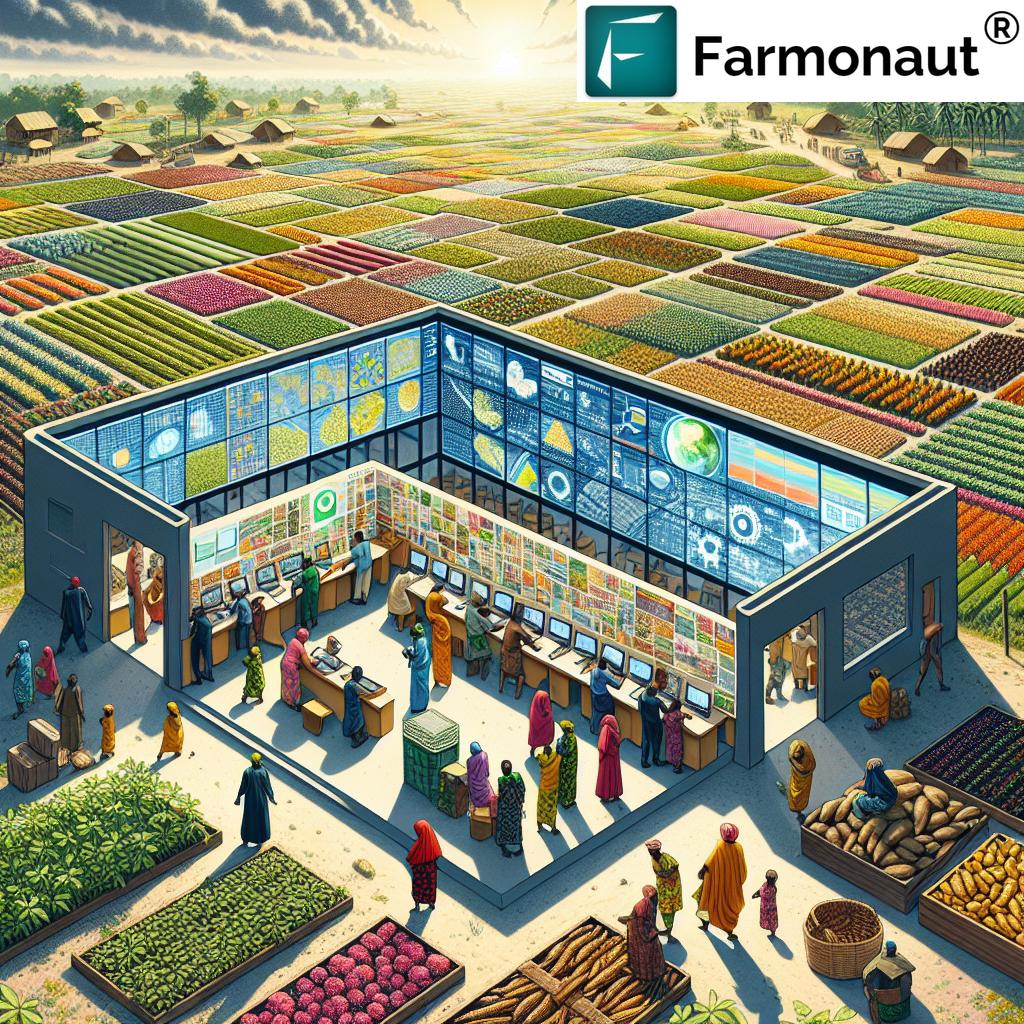
The Power of Public-Private Partnerships
The success of this initiative hinges on the collaborative effort between public and private sectors. This partnership brings together:
- Government agencies providing policy support and infrastructure
- Private tech companies offering innovative solutions
- Financial institutions improving access to credit
- NGOs and international organizations providing funding and expertise
This synergy ensures that the DAES solution is not only technologically advanced but also sustainable and scalable.
Sustainable Agricultural Systems: A Path to Food Security
At the heart of this initiative is the commitment to building sustainable agricultural systems. This approach encompasses:
- Promoting environmentally friendly farming practices
- Enhancing resilience to climate change
- Improving resource use efficiency
- Fostering biodiversity conservation
By embracing sustainability, Nigerian farmers can ensure long-term food security while preserving the environment for future generations.
The Role of AI and Machine Learning in Agriculture
Artificial Intelligence (AI) and Machine Learning (ML) are playing increasingly important roles in modern agriculture. In the context of the DAES solution, these technologies offer:
- Predictive Analytics: Forecasting weather patterns, crop yields, and market trends.
- Personalized Recommendations: Tailoring advice based on individual farm characteristics and farmer preferences.
- Pest and Disease Detection: Early identification of potential threats to crops.
- Optimized Resource Allocation: Suggesting the most efficient use of water, fertilizers, and other inputs.
Companies like Farmonaut are at the forefront of integrating these technologies into their platforms, making precision agriculture accessible to smallholder farmers.
Discover Farmonaut’s AI-powered solutions: Farmonaut API | API Developer Docs
Empowering Women in Agriculture
Women play a crucial role in Nigerian agriculture, yet they often face significant barriers to accessing resources and information. The DAES initiative recognizes this challenge and incorporates specific features to empower women farmers:
- Gender-sensitive content and advisory services
- Financial products tailored to women’s needs
- Training programs focused on enhancing women’s digital literacy
- Networking opportunities to connect women farmers
By addressing gender disparities, the initiative aims to unlock the full potential of Nigeria’s agricultural workforce.
The Impact of Digital Solutions on Agricultural Productivity
The integration of digital solutions in agriculture has shown promising results worldwide. In Nigeria, we anticipate significant improvements in various aspects of farming:
| Digital Solution | Crop Productivity | Market Access | Financial Inclusion | Women’s Empowerment | Accessibility |
|---|---|---|---|---|---|
| USSD | +15% | Medium | High | Medium | Very High |
| IVR | +20% | High | Medium | High | High |
| Smartphone Apps | +30% | Very High | Very High | Medium | Medium |
| Satellite Monitoring (e.g., Farmonaut) | +25% | High | High | Medium | High |
This table illustrates the potential impact of various digital solutions on key aspects of agriculture in Nigeria. It’s important to note that the actual impact may vary depending on factors such as farmer adoption rates, infrastructure development, and policy support.
Challenges and Future Prospects
While the DAES initiative holds immense promise, it’s not without challenges. Some of the key hurdles include:
- Limited digital literacy among farmers
- Inadequate rural internet connectivity
- Cultural barriers to technology adoption
- Ensuring data privacy and security
However, with continued investment in infrastructure, education, and policy support, these challenges can be overcome. The future of Nigerian agriculture looks bright, with digital solutions paving the way for increased productivity, sustainability, and food security.
The Role of Blockchain in Agricultural Traceability
Blockchain technology is emerging as a powerful tool for ensuring transparency and traceability in agricultural supply chains. In the context of Nigeria’s agricultural transformation, blockchain offers several benefits:
- Product Authentication: Verifying the origin and quality of agricultural products.
- Supply Chain Efficiency: Streamlining logistics and reducing waste.
- Fair Pricing: Ensuring farmers receive fair compensation for their produce.
- Food Safety: Enabling quick identification and recall of contaminated products.
Companies like Farmonaut are integrating blockchain technology into their platforms, providing end-to-end traceability solutions for various agricultural products.
The Future of Nigerian Agriculture: A Digital Frontier
As we look to the future, the integration of digital solutions in Nigerian agriculture promises to revolutionize the sector. We anticipate:
- Increased adoption of precision agriculture techniques
- Greater integration of IoT devices in farming
- Expansion of digital marketplaces for agricultural products
- Enhanced use of big data analytics in agricultural planning
These advancements will not only boost productivity but also attract more youth to agriculture, ensuring the sector’s long-term sustainability.
Conclusion: A New Era for Nigerian Agriculture
The Digital Agricultural Extension Services (DAES) initiative marks the beginning of a new era for Nigerian agriculture. By harnessing the power of technology, this transformative approach promises to address long-standing challenges, empower smallholder farmers, and pave the way for a more food-secure future.
As we embrace these innovative solutions, we’re not just improving agricultural productivity; we’re fostering economic resilience, promoting sustainable practices, and contributing to global food security. The journey ahead is exciting, and with continued collaboration between public and private sectors, Nigeria is poised to become a shining example of agricultural innovation in Africa and beyond.
Frequently Asked Questions (FAQ)
- What is the Digital Agricultural Extension Services (DAES) initiative?
The DAES initiative is a public-private partnership aimed at providing innovative digital solutions to empower smallholder farmers in Nigeria with agronomic, market, and financial information. - How does satellite technology benefit farmers?
Satellite technology, like that offered by Farmonaut, provides real-time crop health monitoring, enabling farmers to make informed decisions about irrigation, fertilizer usage, and pest management. - What crops are the focus of this initiative?
The initiative focuses on three key crops: maize, cassava, and cocoa, which are vital to Nigeria’s food security and economy. - How does the DAES solution address gender disparities in agriculture?
The initiative incorporates gender-sensitive content, tailored financial products, and specific training programs to empower women farmers and ensure equal access to digital services. - What technologies are used to ensure accessibility for all farmers?
The initiative integrates USSD, IVR, and smartphone applications to cater to farmers with different levels of technology access and digital literacy.
We hope this comprehensive overview has provided valuable insights into the transformative potential of digital solutions in Nigerian agriculture. As we continue to innovate and collaborate, the future of farming in Nigeria looks brighter than ever.








